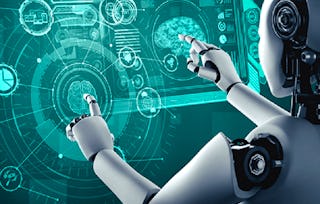"AI for Energy and Biomedical Applications” explores the groundbreaking applications of AI technologies revolutionizing energy systems and advancing healthcare solutions. In the energy sector, AI is reshaping how we generate, distribute, and manage energy resources. From optimizing renewable energy production to enhancing energy efficiency and grid management, AI offers unprecedented opportunities for sustainability and resilience. Through this course, you will explore AI-driven techniques such as predictive maintenance, demand forecasting, and energy storage optimization, empowering you to drive innovation and address pressing energy challenges. In the realm of biomedical applications, AI is driving breakthroughs in disease diagnosis, drug discovery, and personalized medicine. You’ll delve into AI-driven approaches to medical image analysis, genomic data interpretation, and predictive modeling of disease progression. You’ll also gain insights into how AI is revolutionizing healthcare delivery, enabling early detection of diseases, and facilitating precision medicine tailored to individual patients.

AI for Energy and Biomedical Applications
Ends soon: Gain next-level skills with Coursera Plus for $199 (regularly $399). Save now.

AI for Energy and Biomedical Applications
This course is part of AI for Mechanical Engineers Specialization

Instructor: Wei Lu
2,830 already enrolled
Included with
(31 reviews)
Recommended experience
What you'll learn
Gain proficiency with AI techniques for energy optimization
Develop an understanding of AI applications in biomedical sciences
Experiment with AI approaches to address energy and biomedical problems
Skills you'll gain
Details to know

Add to your LinkedIn profile
3 assignments
See how employees at top companies are mastering in-demand skills

Build your subject-matter expertise
- Learn new concepts from industry experts
- Gain a foundational understanding of a subject or tool
- Develop job-relevant skills with hands-on projects
- Earn a shareable career certificate

There are 3 modules in this course
In module 1 we will review challenges that we may face energy optimization. Then, we will explain different AI-driven energy optimization techniques including demand forecasting, load management, and renewable energy integration. Finally, we will examine AI-driven optimization strategies for energy storage systems.
What's included
2 videos5 readings1 assignment1 ungraded lab
In module 2, we explain predictive maintenance principles and continue to review AI driven predictive maintenance techniques including machine learning, deep learning, and anomaly detection algorithms. We explain how predictive maintenance models can be trained and optimized. Finally, we discuss strategies for integrating AI-driven predictive maintenance models into existing energy infrastructure systems.
What's included
2 videos2 readings1 assignment1 ungraded lab
In module 3, we review how AI techniques are used to analyze medical images and to interpret genomic data. We will discuss how AI has impacted drug discovery and other biomedical applications.
What's included
2 videos4 readings1 assignment
Earn a career certificate
Add this credential to your LinkedIn profile, resume, or CV. Share it on social media and in your performance review.
Instructor

Offered by
Explore more from Mechanical Engineering
 Status: Free Trial
Status: Free Trial Status: Free Trial
Status: Free TrialL&T EduTech
 Status: Free Trial
Status: Free Trial Status: Preview
Status: PreviewNortheastern University
Why people choose Coursera for their career




Learner reviews
31 reviews
- 5 stars
67.74%
- 4 stars
16.12%
- 3 stars
3.22%
- 2 stars
3.22%
- 1 star
9.67%
Showing 3 of 31
Reviewed on Oct 23, 2025
very valuable and important information.
Frequently asked questions
To access the course materials, assignments and to earn a Certificate, you will need to purchase the Certificate experience when you enroll in a course. You can try a Free Trial instead, or apply for Financial Aid. The course may offer 'Full Course, No Certificate' instead. This option lets you see all course materials, submit required assessments, and get a final grade. This also means that you will not be able to purchase a Certificate experience.
When you enroll in the course, you get access to all of the courses in the Specialization, and you earn a certificate when you complete the work. Your electronic Certificate will be added to your Accomplishments page - from there, you can print your Certificate or add it to your LinkedIn profile.
Yes. In select learning programs, you can apply for financial aid or a scholarship if you can’t afford the enrollment fee. If fin aid or scholarship is available for your learning program selection, you’ll find a link to apply on the description page.
More questions
Financial aid available,





